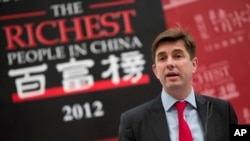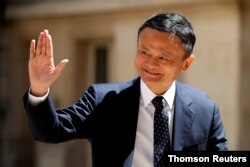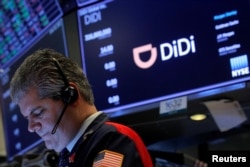Beijing’s crackdown on high-profile market sectors like tech is upending share prices and forcing a radical reranking of China’s really, really rich as the government changes its economic focus to embrace enterprises that promote wider prosperity.
Some billionaires even tumbled off the Hurun Global Rich List, which ranks the world’s wealthiest individuals even as it focuses on those in China, home to more billionaires than any other nation.
In late 2020, Chinese regulators launched a crackdown on the country’s tech giants in an effort to curb their influence and maintain control over assets such as big data that the government deemed critically important.
Authorities moved to enforce an antitrust measure that had been largely ignored and fined Alibaba, Jack Ma's tech behemoth, a record $2.8 billion, according to the Lawfare blog.
Analysts say the shake-up among China's richest goes beyond the impact of the crackdown, which included sectors such as real estate, internet, tech and education. The new rich list reveals how central government policies are elevating other sectors, such as new energy and hardware manufacturing.
According to the 2022 list, which Hurun released last week, the tech billionaires in China who were hit hard last year included Ma Huateng, founder and CEO of China’s internet conglomerate Tencent. Ma saw his wealth drop to $52 billion, as he slumped to the slot of the fourth-richest billionaire in China and a ranking of number 28 globally. Jack Ma ranked fifth among Chinese billionaires. This was the first time that the two entrepreneurs had not been in China's top three slots since 2015.
And China shed 160 billionaires in 2021, accounting for half the world’s total of 337 list laggards who are now mere multimillionaires.
“China’s billionaires have been hit hard in the past year, with nine of the top 10 biggest wealth shrinkages and 160 drop-offs,” said Rupert Hoogewerf, Hurun Report chairman and chief researcher. He added that many of China’s biggest companies have lost as much as half their value, the steepest drop in value since the global financial crisis in 2008.
Hoogewerf said that e-commerce platforms, real estate, education, generic drugs and vaping were the hardest-hit sectors. COVID control measures, tensions with the United States, anti-monopoly regulations and China's recently introduced push for common prosperity were behind the declines, he added.
Gary Ting, managing partner of the Shanghai-based venture capital fund KYMCO Capital, told VOA Mandarin that the rich list reflects two major economic policies: One is more government control over the economy, the other is suppression of the virtual economy and support of the real economy. The virtual economy refers to ways of generating income that operate fully online, and the real economy concerns the production, purchase, and flow of goods and services.
Paul Fang, vice director of the Shanghai Institute for National Economy, agreed and told VOA Mandarin, “Other promising sectors involve industries related to pandemic control, artificial intelligence, as well as a stronger health industry to cope with an aging population.”
Wang Guo-Chen, an assistant research fellow at the Chuang-Hua Institution for Economic Research in Taipei, said government subsidies are also behind the surge in sectors such as manufacturing and electric vehicles.
“From the policy that encouraged the sales of home appliances and vehicles to people living in the countryside in 2008, to the push for electric cars in recent years, government subsidies have been able to attract large-scale private investment,” he told VOA Mandarin in a phone interview.
Ting, the venture capitalist, said he expected Beijing to relax its supervision of big tech companies to a certain extent this year, citing the slowdown of China’s economy and the goal of 5.5% GDP growth.
“I think China’s economy will perform worse than expected this year,” Ting told VOA Mandarin. “So, to achieve the GDP goal, Beijing might gradually loosen its control over tech companies. The signs include the rise of the Hang Seng index in Hong Kong, as well as Didi’s listing in Hong Kong.”
Chinese authorities targeted Didi Global, a ride-hailing company, requiring it to resubmit a proposal after it pushed through a $4.4 billion U.S. initial public offering in June, according to Bloomberg, which had reported Didi’s announcement in December that it planned to delist in the U.S. in favor of a listing in Hong Kong.
The Hang Seng move is now in regulatory limbo after Chinese regulators found the company had fallen short on required measures to prevent security and data leaks and removed the Didi app from Chinese app stores.
Despite losing some billionaires, China’s remaining 1,133 billionaires is almost twice the U.S. total of 716. The world’s two largest economies account for 55% of the billionaires in the world, with Tesla’s Elon Musk ($205 billion) topping the list, Amazon’s Jeff Bezos ($188 billion) in second place and other U.S. residents occupying all but three of the top 10 slots.
Zhong Shanshan ($72 billion), the founder of bottled water company Nongfu Spring, is China’s richest man, ranking 15th worldwide. The second-richest Chinese billionaire, and 23rd on the global list, is ByteDance founder Zhang Yiming ($54 billion). Zeng Yuqun ($53 billion), the founder of CATL, which specializes in the manufacturing of lithium ion batteries for electric vehicles, is the third-richest Chinese billionaire and is 24th globally with assets growing by more than $15 billion last year.







